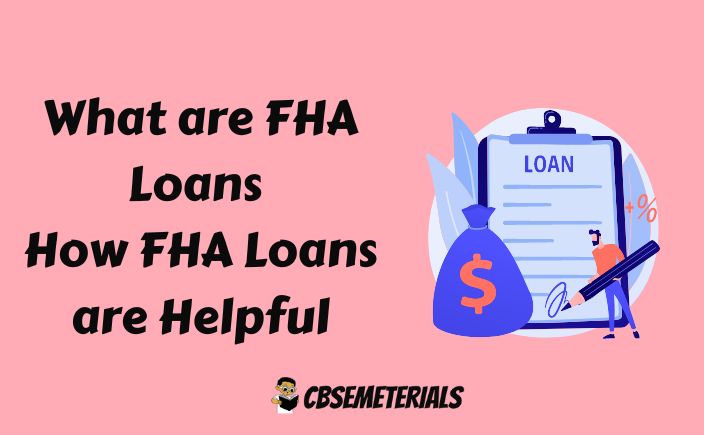An overview of FHA loans
In order to help Americans find cheap homes during the Great Depression, the Federal homes Administration (FHA) was set up in 1934 as a part of the National Housing Act. Since it insures loans for borrowers with low and moderate incomes who might not otherwise be able to qualify for a conventional mortgage, the FHA has grown to play a crucial role in the US housing market.
Recent years have seen a rise in the popularity of FHA loans, and for good reason. They provide a variety of advantages over conventional mortgages, including reduced down payment requirements, laxer credit score restrictions, and more flexible underwriting standards. We will give a comprehensive overview of FHA loans and their advantages in this article.
What Are FHA Loans?
The Federal Housing Administration (FHA) insures mortgages that are backed by the government. These loans are intended to assist borrowers with low and moderate incomes who would have trouble being approved for conventional mortgages. Private lenders, including banks and credit unions, offer FHA loans, which are insured by the FHA and backed by the federal government.
FHA loans differ from conventional mortgages in a number of important ways. The down payment prerequisite is one of the most important. Borrowers normally need to put down 20% of the home’s purchase price when getting a standard mortgage. However, borrowers can only put down 3.5% of the purchase price when using an FHA loan.
FHA loans also have fewer strict credit score criteria than regular mortgages, which is another benefit. FHA loans can be obtained by customers with credit scores as low as 580, although conventional mortgages sometimes require a score of 620 or higher. In addition, if they can show compensating factors like a track record of on-time rental payments or a substantial income relative to their debts, borrowers with lower credit scores may still be able to qualify for an FHA loan.
In addition, the underwriting standards for FHA loans are more lenient than those for conventional loans. For instance, FHA loans may let borrowers to have a debt-to-income ratio (DTI) as high as 50%, but conventional mortgages normally call for a DTI of 43% or below. As a result, individuals with higher debt loads might still be eligible for an FHA loan.
Finally, because FHA loans are assumable, the buyer of the property can take over the loan’s obligations if the borrower sells it. For borrowers who must sell their property but are unable to refinance owing to changes in the housing market or their financial circumstances, this can be a considerable advantage.
Various FHA loan types
Borrowers can choose from a variety of FHA loans, including:
FHA fixed-rate loans: These loans feature a fixed monthly payment and interest rate. For the duration of the loan, which may be 15 or 30 years, both the interest rate and the payment amount remain the same.
Fixed-Rate FHA Loans : The interest rate on these loans is variable and subject to cyclical changes in the market. Although it may eventually rise, the initial interest rate is typically lower than the rate for fixed-rate FHA loans.
FHA 203(k) Loans: These loans are intended for borrowers who want to buy a house that requires substantial renovations or repairs. The cost of the house as well as the repairs, which are finished after the loan is closed, are both covered by the loan.
Benefits of FHA Loans
FHA loans have a number of advantages, such as:
- Lower Down Payment Requirements: Borrowers can use an FHA loan to put down as little as 3.5% of the purchase price, which can be a big benefit for those who don’t have a lot of savings.
- More Forgiving Credit Score standards: Compared to conventional mortgages, FHA loans have more forgiving credit score standards, which means that applicants with lower credit scores may still be eligible for a mortgage.
- More Flexible Underwriting Standards: Compared to conventional mortgages, FHA loans offer more flexible underwriting standards, which may allow borrowers with bigger debt loads to still get approved for a loan.
- Assumable Loans: Because FHA loans are assumable, the buyer of the property that the borrower is selling may absorb the loan and continue to make the required payments. For borrowers who must sell their property but are unable to refinance owing to changes in the housing market or their financial circumstances, this can be a considerable advantage.
- FHA 203(k) Loans: For borrowers looking to buy a house that requires extensive repairs or upgrades, FHA 203(k) loans can be a fantastic alternative. The cost of the house as well as the repairs, which are finished after the loan is closed, are both covered by the loan.
How to Qualify for an FHA Loan
- Although FHA loans have more lenient credit score requirements than conventional mortgages, borrowers must still have a credit score of at least 500 in order to be eligible for an FHA loan. Borrowers with credit scores between 500 and 579, however, will need to put down a bigger deposit of at least 10%.
- Debt-to-Income Ratio (DTI): Compared to conventional mortgages, FHA loans often have a higher maximum DTI. A borrower’s monthly debt obligations cannot be greater than 50% of their gross monthly income under the FHA’s 50% maximum DTI rule.
- Employment History: FHA lenders normally demand that borrowers have a continuous employment history of at least two years. Borrowers with less job history can be eligible, nevertheless, if they have recently completed their military service or graduated from college.
- Income: The borrower must show that their monthly expenses, including their mortgage payment, can be covered. FHA lenders often demand that borrowers present proof of their income in the form of pay stubs or tax returns.
- FHA loans may only be used to buy primary residences, and the property in question must adhere to specified minimum requirements. For instance, the property has to be in good shape and be devoid of any flaws or safety risks.
It’s vital to remember that borrowers will still need to prove their ability to repay the loan even if FHA loans have less eligibility restrictions than conventional mortgages. It could be difficult for borrowers with a history of late payments, bankruptcy, or foreclosure to be approved for an FHA loan.




